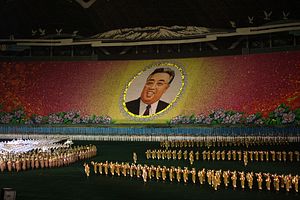On a nighttime satellite image, glowing lights from South Korea and northeast China suddenly disappear: at the thirty-eighth parallel from the south, and the Yalu River from the north. The dark expanse known as North Korea seems to render South Korea an island cut off from the Asian continent. While North Korea is often referred to as a buffer state, its nocturnal invisibility makes it clear: Wedged between South Korea, the most wired country in the world, and China, the country with the most cell phones, North Korea has no buffer against digital communications. North Korea’s information blockade raises some basic questions: How long can the Kim Jong-Un regime keep up its war against information? And does its survival depend on information deprivation?
Inside North Korea today, a quiet revolution led by a slowly opening media environment provides perhaps the greatest prospect for regime transformation. The U.S. and South Korea should encourage this development to strengthen their negotiating position with Pyongyang, and to bring positive, if not dramatic, change to North Korea.
Over the past two decades, a steady trickle of outside information has widened the gap between North Korean propaganda and reality. The source of this change can be traced back to the 1990s, when a devastating famine killed between 600,000 and 2.5 million people. As North Korea’s public distribution system collapsed, informal markets sprang up. Today, these markets are the primary source of food and income for many North Koreans, as well as hubs where people can share sensitive information, foreign media, and electronic devices. Today more North Koreans are watching foreign DVDs and TV programs, listening to foreign radio broadcasts, and using illegal mobile phones than ever before.
Growing access to foreign media is changing North Koreans’ behavior, thoughts, and attitudes about the outside world—and their own country. In a subtle yet significant break from past behavior, North Koreans are increasingly watching illegal DVDs and programs with friends and family. This change in behavioral norms could signify a move towards greater trust and stronger social bonds among the people. As North Koreans become more aware of family members and friends who share their negative views about the regime, they may feel emboldened and more confident in sharing their own.
In fact, an InterMedia report commissioned by the State Department found that for North Koreans, exposure to foreign media is leading to more favorable attitudes and beliefs about the outside world, including the U.S. and South Korea, and more negative views about the regime. As innocuous as they may seem, South Korean DVDs may be the bane of the Kim regime’s existence. In the report, one young defector summarizes why: “I was told when I was young that South Koreans are very poor, but the South Korean dramas proved that just isn’t the case.” It is no coincidence that nine out of ten defectors report that they had access to foreign media while in North Korea. As exposure to foreign media increases, it is reasonable to expect that the Kim regime will increasingly lose credibility.
Kim is trying to halt this trend. In February, the U.N. reported that he established an interagency task force to intensify crackdowns on the transfer of South Korean soap operas and films and the use of foreign mobile phones, with punishments ranging from prison camps to public executions. It is unclear if this is having a significant deterrent effect. One thing that is clear is that foreign information is a serious problem for the Kim regime. For that reason, it can also be a serious policy instrument for the U.S. and South Korea.
As the gap between propaganda and reality continues to widen, the Kim regime could find itself in a corner. Once state might is revealed as state myth to the majority of the population, Mr. Kim could face a momentous choice between reform and a violent crackdown to maintain power. Either way, North Koreans would be unlikely to acquiesce to the arbitrary rule of the Kim regime. In such a rapidly deteriorating situation, the regime’s elites may be more inclined to denuclearize and curb their human rights abuses in return for protection or assurances of a soft landing.
The wheels of change are in motion in North Korea; the U.S and South Korea should grease them. First, they should increase funding for organizations that transmit foreign radio broadcasts into North Korea, many of which depend on private donations and run on shoestring budgets. Second, they should support NGOs—such as Committee for Human Rights in North Korea, Choson Exchange, and LiNK—that expose human rights violations in North Korea and provide training and exchange programs to North Koreans. Investing in the above strategies does not guarantee regime reform, but early returns tell us they are making a difference. That alone is more than can be said of any other attempt to bring change to North Korea.
Escape from Camp 14 recounts Shin Dong-Hyuk’s escape from one of North Korea’s most notorious prison camps. Although Shin endured unspeakable deprivations and suffering in the camp, the driving force behind his decision to escape was ultimately quite simple: the prospect of eating meat.
We do not know what information will be the tipping point for a person, community, or nation. We do know that providing a picture of the outside world increases the chances that this tipping point will be reached. For the people of North Korea, that moment cannot come soon enough. It is time to turn up the volume on North Korea’s quiet revolution.
Zachary Przystup received a master’s degree in international relations from The Fletcher School of Law and Diplomacy, Tufts University in May.

































